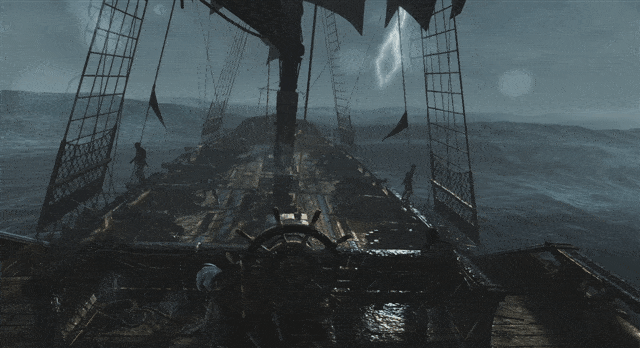 Finally, someone has articulated my feelings about how Assassin’s Creed IV : Black Flag seems so schizophrenically awful and awesome at the same time, and why this installment still seems like such a game-changer despite the persistent drawbacks in its franchise.
Finally, someone has articulated my feelings about how Assassin’s Creed IV : Black Flag seems so schizophrenically awful and awesome at the same time, and why this installment still seems like such a game-changer despite the persistent drawbacks in its franchise.
What drawbacks, you ask, citing the AC franchise’s massive profitability?
Well, I’ll go into how to create a better high seas, open-world game later, specifically citing some of the crappy things in AC that you might not have even noticed. But, for now, let’s just talk about how the creators of Assassin’s Creed, a collection of perhaps the greatest period pieces in the history of video games can’t just let it be the greatest collection of period pieces.
DO ONE THING
 In Assassin’s Creed, every few missions, just when you’ve forgotten everything else and become gloriously lost in the beautifully crafted quasi-historical setting, the designers sabotage that sweet immersion by dumping you unexpectedly into an utterly lame modern-day story laced with crappy science and even crappier spirituality.
In Assassin’s Creed, every few missions, just when you’ve forgotten everything else and become gloriously lost in the beautifully crafted quasi-historical setting, the designers sabotage that sweet immersion by dumping you unexpectedly into an utterly lame modern-day story laced with crappy science and even crappier spirituality.
How many AC fans do not at least groan, if not vocally threaten the screen, when our gorgeous dream of the romantic past is so rudely shattered by being awakened into … fun! … an office?
Let’s be completely frank. The historical settings of Assassin’s Creed are, with a few caveats, blockbuster epics of gaming. The modern-day segments and First Civilization sequences are complete B-movie dreck that would make Syfy balk at airing them.
And, in an apparent effort to out-JarJar George Lucas, Ubisoft has made clear their intent to double down on the modern-day and First Civilization garbage. Do a Google search for /assassin’s creed “hate the modern”/ and you’ll see how tone-deaf this is.
I have felt for a long time that Assassin’s Creed is really two games, the excellence of one smothered under the weight of the other, similar to how the melancholy tale of romantic anxiety in Hey Ya! gets smothered under the catchy, bouncy groove.
But, at least in OutKast’s song, both parts are good in their own right. In Assassin’s Creed, you have historical settings that constitute an unmatched achievement in open-world gaming stitched to a laughable, obnoxious third-rate bit of Tomb Raider knock-off junk.
And, even if AC had glommed together two decent games (which, let’s make clear, it does not) this would still be a problem. Remember Curly’s advice? Do one thing. Just one thing.
BURYING THE LEAD
 Which brings me to the guy who articulated my feelings about Black Flag, Luke Plunkett at Kotaku. Beyond the fact that the entire AC series bipolar, he points out that IV adds another layer of split personality to the mix:
Which brings me to the guy who articulated my feelings about Black Flag, Luke Plunkett at Kotaku. Beyond the fact that the entire AC series bipolar, he points out that IV adds another layer of split personality to the mix:
There are actually two games inside Assassin’s Creed IV. On occasions they come together, but for the most part they stand apart, symbols of a divide in not just game design, but also player enjoyment.
One stars a man called Edward and traps you inside a janky on-foot adventure, with a storyline that’s falling apart and missions designed to bring out the worst in Assassin’s Creed’s heavy and ageing control scheme.
The other stars a boat called the Jackdaw, and is just the best.
Assassin’s Creed IV’s marketing and design may have led you to believe one of them (the Jackdaw’s half) exists only to serve the other. That it’s simply a collection of sidequests, peripheral diversions from Edward’s big quest, but that’s simply not the case. If you played Black Flag like that, treating your own private pirate ship as nothing more than a travel device and upgrade accessory, I feel bad for you son.
 To be fair, this split personality started before Black Flag, when sea travel was first introduced to the franchise in AC III. In fact, the maritime focus of AC IV, an installment that steps backward in history for the first time in the franchise, is likely a response to the immense popularity of the seafaring in AC III. Gamers loved it!
To be fair, this split personality started before Black Flag, when sea travel was first introduced to the franchise in AC III. In fact, the maritime focus of AC IV, an installment that steps backward in history for the first time in the franchise, is likely a response to the immense popularity of the seafaring in AC III. Gamers loved it!
Yet, just like when they subvert the excellent historical fiction of the entire Assassin’s Creed franchise with a crummy modern storyline about ancient god-aliens (or whatever the f#@% they’re supposed to be), Ubisoft also subverts the best part of Black Flag by trying to make it subordinate to the weaker part.
And, other than Rogue, in subsequent installments of Assassin’s Creed, which are (surprise!) plagued with criticism, they scuttled the seafaring aspect. Unity, which was so bug-ridden that it strongly suggests Ubisoft is just getting lazy, has been described as “a step back.” Even more weird, they’re starting to pump out AC games in archaic 2.5D!
As I said before, completely tone-deaf.
THE WAY FORWARD
But, there’s something else in Plunkett’s commentary that ties the ship-shore duality he sees in AC IV to the historical-modern one I see in the entire series:
There are systems and locations and battles here that all relate and co-exist as though there wasn’t a narrative campaign at all.
It’s not that there aren’t good elements in the narrative campaign. There are. But, they’re corrupted with a lot of gunk. Stripped clean of that gunk, the historical narrative really shines. And, in Black Flag, it harmonizes with the seafaring.
I think we can tease out the good from the bad here by drawing a line and sweeping the bad parts to one side and the good parts to the other. On the good side are the historical setting, the internal coherence of that world, and the seafaring freedom of an openly roam-able world. On the bad side are god-aliens, modern-day interruptions, and clumsily archaic game elements.
It may be, as some have suggested, that Assassin’s Creed (and other treadworn franchises) should simply be shut down. Perhaps, but what we’ve learned from Black Flag, about a high seas adventure genre that is far larger than Assassin’s Creed, could be used to create an unstoppable new franchise.
Here’s how I would create such a franchise.
First, ditch all the 90s-style Mario Bros elements that remind you that you’re in a video game: one-dimensional forced chase sequences, collectible “coins” lying around (in the form of chests, naval drops, flying documents, and Animus fragments), and a progression through bigger and bigger bosses. Today’s gamers seem to prefer the open-ended, realistic sandbox, perhaps with a optional missions and organic story elements thrown in.
In the real world, your crew doesn’t learn new sea shanties when their captain chases down a piece of paper. They learn them from new crew members. Simulating this in Black Flag would have been an absurdly easy fix.
And, Black Flag uses a fantastic and engaging technique for finding treasure chests: the pirate genre mainstay of treasure maps. Plus, realistic elements like guarded chests and warehouses are incredibly fun! Why muddle this by strewing the landscape with random prizes without meaningful context, like the fruits in Pac-Man?
Second, eliminate the gunk. If Ubisoft spins off another Edward-oriented seafaring game, they need to drop the Animus premise, and with it all of the enraging modern interludes.
Ironically, they should release the game that, in the Black Flag setting itself, Abstergo is designing. (It’s like Ubisoft can’t see the obvious way forward when it’s right in front of their eyes!)
But, if anyone else picks up the high seas adventure trope for a new line of games, please remember what Curly said. Just do the high seas thing.
Third, as I have suggested before, use the massive computing power of today’s consoles to grow the world, not the forced narrative. If you absolutely have to do story-lines, with all of the cinematics and voice acting and pretending like you’re a movie producer, do it in DLC. Save the basic game for the world.
This means less time and code wasted on gunk and confining storylines and more attention focused on filling out those frustratingly empty buildings. I don’t care if the same furniture appears in multiple taverns and shops and inns and homes. Make buildings that are buildings, not just boxes painting to look like buildings.
 This also means larger wilderness areas, including separating the islands and other land-masses so that the player gets a real sense of being on the open sea. One of the drawbacks of Black Flag is that you’re almost never out of sight of land and other ships. It generates claustrophobia in a genre that doesn’t bear claustrophobia well. Play to the strengths of the milieu.
This also means larger wilderness areas, including separating the islands and other land-masses so that the player gets a real sense of being on the open sea. One of the drawbacks of Black Flag is that you’re almost never out of sight of land and other ships. It generates claustrophobia in a genre that doesn’t bear claustrophobia well. Play to the strengths of the milieu.
Finally, learn a few tricks from Rockstar and stop creating landscape that you arbitrarily can’t explore. Gamers can roam up and down every hill in San Andreas, but in Assassin’s Creed you are constantly bumping into gaming walls. Again, this is a lazy, Mario Bros archaism. Just, stop it.
No excuses. In a parkour-driven game, we should be able to climb every surface. Sure, they won’t all be equally easy to climb, but the player should be able to increase their climbing skill until everything is open to them. No excuses. Just stop it.
Fourth, also use the code-space salvaged from the gunk to build better social algorithms.
For example, if you’re worried about what the player would do while out on the open sea with nothing in sight, build some social dynamics into the crew. Research the politics of shipboard life, and not just among pirates, but among merchant and naval crews. Binge-watch Black Sails, Pirates of the Caribbean, and Master and Commander. Take some clues from The Sims and add some friendship, loyalty, and enmity dynamics.
Let the player step away from the wheel and do something other than steer. Build alliances. Put down mutinies. Tend the cargo. Help repair the ship. Maybe even start below the rank of captain and do some social ladder-climbing.
And, do something about the dumb, killer cops that plague so many games, Rockstar’s GTA franchise included. Disappointingly simple-minded authority AIs result in a lot of silly artifacts, like police that have the memory of the proverbial goldfish and forget you entirely after losing sight of you. Games often mitigate this by incorporating a persistent wanted level, but this too is a clumsy technique. How can every constable in the world either recognize you on sight, without ever having met you, or completely forget about you five minutes after you punch him in the face?
The most unforgivably inane aspect of this is that authority AIs rarely arrest anyone, simplifying every encounter to a blazing shoot-out. This eliminates a lot of interesting gameplay options, as jailbreaks and rescues and negotiated releases figure into stories from a variety of genres.
Want to know a secret? I would much rather deal with the danger (and ensuing drama) of being imprisoned than the work-a-day tedium of roaming the world looking for a monkey to murder so I can stitch together my own grenade bag. Game designers worked out crafting, how about some game elements that actually regularly feature in adventure stories?
I’M NAILING THIS COIN TO THE MAST
 I really think that high seas adventure game could spawn a break-out franchise.
I really think that high seas adventure game could spawn a break-out franchise.
The seafaring sideline in AC III, developed in Rogue and Black Flag, is revolutionary. Unfortunately, that revolution was saddled with a lot of legacy baggage from the franchise and likely a self-indulgent culture at Ubisoft that is unresponsive to gamer feedback, just resting on their laurels, and incapable of telling the difference between a revolution and a sideline.
Perhaps someone else can learn the lessons from Black Flag (and the other games I’ve mentioned) and develop a high seas adventure game that raises the stakes and the bar.

Elevator Pitch – Dove City : Open-world game as platform | J. Nelson Leith
May 9, 2015 at 1:01 pm
[…] GTA, Assassin’s Creed, and Halo can be salvaged with some core tweaks. I’ve discussed how to save AC‘s seafaring trope before, but I think the satiric, modern-day, urban trope of GTA can be saved as […]